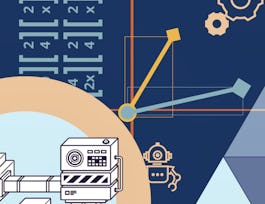Data science courses contain math—no avoiding that! This course is designed to teach learners the basic math you will need in order to be successful in almost any data science math course and was created for learners who have basic math skills but may not have taken algebra or pre-calculus. Data Science Math Skills introduces the core math that data science is built upon, with no extra complexity, introducing unfamiliar ideas and math symbols one-at-a-time.


Data Science Math Skills
Taught in English
Some content may not be translated
450,261 already enrolled
(11,701 reviews)
Skills you'll gain
Details to know

Add to your LinkedIn profile
14 quizzes
See how employees at top companies are mastering in-demand skills


Earn a career certificate
Add this credential to your LinkedIn profile, resume, or CV
Share it on social media and in your performance review

There are 5 modules in this course
This short module includes an overview of the course's structure, working process, and information about course certificates, quizzes, video lectures, and other important course details. Make sure to read it right away and refer back to it whenever needed
What's included
1 video2 readings
This module contains three lessons that are build to basic math vocabulary. The first lesson, "Sets and What They’re Good For," walks you through the basic notions of set theory, including unions, intersections, and cardinality. It also gives a real-world application to medical testing. The second lesson, "The Infinite World of Real Numbers," explains notation we use to discuss intervals on the real number line. The module concludes with the third lesson, "That Jagged S Symbol," where you will learn how to compactly express a long series of additions and use this skill to define statistical quantities like mean and variance.
What's included
10 videos4 readings4 quizzes
This module builds vocabulary for graphing functions in the plane. In the first lesson, "Descartes Was Really Smart," you will get to know the Cartesian Plane, measure distance in it, and find the equations of lines. The second lesson introduces the idea of a function as an input-output machine, shows you how to graph functions in the Cartesian Plane, and goes over important vocabulary.
What's included
8 videos3 readings3 quizzes
This module begins a very gentle introduction to the calculus concept of the derivative. The first lesson, "This is About the Derivative Stuff," will give basic definitions, work a few examples, and show you how to apply these concepts to the real-world problem of optimization. We then turn to exponents and logarithms, and explain the rules and notation for these math tools. Finally we learn about the rate of change of continuous growth, and the special constant known as “e” that captures this concept in a single number—near 2.718.
What's included
7 videos3 readings3 quizzes
This module introduces the vocabulary and notation of probability theory – mathematics for the study of outcomes that are uncertain but have predictable rates of occurrence. We start with the basic definitions and rules of probability, including the probability of two or more events both occurring, the sum rule and the product rule, and then proceed to Bayes’ Theorem and how it is used in practical problems.
What's included
8 videos4 readings4 quizzes
Instructors


Offered by
Recommended if you're interested in Math and Logic

University of London

Stanford University

The State University of New York

Imperial College London
Why people choose Coursera for their career




Learner reviews
Showing 3 of 11701
11,701 reviews
- 5 stars
64.61%
- 4 stars
27.34%
- 3 stars
5.57%
- 2 stars
1.57%
- 1 star
0.89%

Open new doors with Coursera Plus
Unlimited access to 7,000+ world-class courses, hands-on projects, and job-ready certificate programs - all included in your subscription
Advance your career with an online degree
Earn a degree from world-class universities - 100% online
Join over 3,400 global companies that choose Coursera for Business
Upskill your employees to excel in the digital economy
Frequently asked questions
No. Completion of a Coursera course does not earn you academic credit from Duke; therefore, Duke is not able to provide you with a university transcript. However, your electronic Certificate will be added to your Accomplishments page - from there, you can print your Certificate or add it to your LinkedIn profile.
Access to lectures and assignments depends on your type of enrollment. If you take a course in audit mode, you will be able to see most course materials for free. To access graded assignments and to earn a Certificate, you will need to purchase the Certificate experience, during or after your audit. If you don't see the audit option:
The course may not offer an audit option. You can try a Free Trial instead, or apply for Financial Aid.
The course may offer 'Full Course, No Certificate' instead. This option lets you see all course materials, submit required assessments, and get a final grade. This also means that you will not be able to purchase a Certificate experience.
When you purchase a Certificate you get access to all course materials, including graded assignments. Upon completing the course, your electronic Certificate will be added to your Accomplishments page - from there, you can print your Certificate or add it to your LinkedIn profile. If you only want to read and view the course content, you can audit the course for free.


